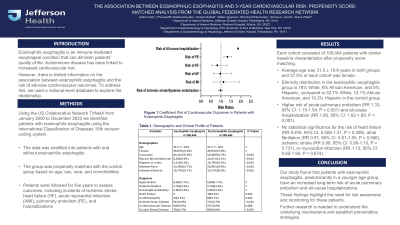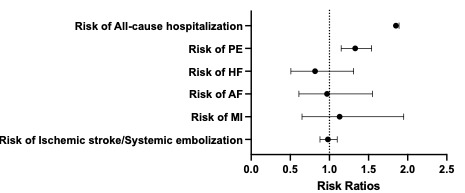Tuesday Poster Session
Category: Esophagus
P3920 - The Association Between Eosinophilic Esophagitis and 5-Year Cardiovascular Risk: A Propensity Score-Matched Analysis From the Global Federated Health Research Network
Tuesday, October 29, 2024
10:30 AM - 4:00 PM ET
Location: Exhibit Hall E

Has Audio

Jordan Carty, MD
Albert Einstein Medical Center
Philadelphia, PA
Presenting Author(s)
Jordan Carty, MD1, Phuuwadith Wattanachayakul, MD2, Karecia Byfield, MD1, Walter Y. Agyeman, MD, MPH3, Blanche Echikunwoke, MD1, Simone A. Jarrett, MBBS1, James Walter, MD4
1Albert Einstein Medical Center, Philadelphia, PA; 2Albert Einstein Medical Center, Philadephia, PA; 3Piedmont Athens Regional, Athens, GA; 4Einstein Healthcare Network, Philadelphia, PA
Introduction: Eosinophilic esophagitis is an immune-mediated esophageal condition that can diminish patients' quality of life. Autoimmune disease has been linked to increased cardiovascular risk. However, there is limited information on the association between eosinophilic esophagitis and the risk of adverse cardiovascular outcomes. To address this, we used a national-level database to explore the relationship.
Methods: We conducted a retrospective cohort study using data from the US Collaborative Network TriNetX, spanning January 2000 to December 2023. Patients with eosinophilic esophagitis were identified and compared to healthy individuals without the condition. The eosinophilic esophagitis group was matched with a control group based on age, sex, race, and comorbidities. We followed these patients for five years to assess outcomes, including incidents of ischemic stroke, heart failure, acute myocardial infarction, atrial fibrillation, pulmonary embolism, and hospitalizations.
Results: Each cohort consisted of 105,494 patients with similar baseline characteristics after propensity score matching. The average age was 31.5 ± 19.8 years, and 37.9% of each cohort was female. Ethnicity distribution in the eosinophilic esophagitis group was 76% White, 6% African American, and 5% Hispanic, compared to 52.7% White, 13.1% African American, and 10.2% Hispanic in the control group. Our analysis found that within five years, patients with eosinophilic esophagitis had a significantly higher risk of acute pulmonary embolism (RR 1.33, 95% CI: 1.15-1.54, P < 0.001) and all-cause hospitalization (RR 1.85, 95% CI: 1.82-1.89, P < 0.001). However, there was no association between eosinophilic esophagitis and the risk of heart failure (RR 0.816, 95% CI: 0.508-1.31, P = 0.399), atrial fibrillation (RR 0.97, 95% CI: 0.61-1.55, P = 0.906), ischemic stroke (RR 0.98, 95% CI: 0.88-1.10, P = 0.731), or myocardial infarction (RR 1.13, 95% CI: 0.65-1.95, P = 0.674).
Discussion: Our study found that patients with eosinophilic esophagitis, predominantly in a younger age group, have an increased long-term risk of acute pulmonary embolism and all-cause hospitalizations. These findings highlight the need for risk awareness and monitoring for these patients. Further research is needed to understand the underlying mechanisms and establish preventative strategies.

Disclosures:
Jordan Carty, MD1, Phuuwadith Wattanachayakul, MD2, Karecia Byfield, MD1, Walter Y. Agyeman, MD, MPH3, Blanche Echikunwoke, MD1, Simone A. Jarrett, MBBS1, James Walter, MD4. P3920 - The Association Between Eosinophilic Esophagitis and 5-Year Cardiovascular Risk: A Propensity Score-Matched Analysis From the Global Federated Health Research Network, ACG 2024 Annual Scientific Meeting Abstracts. Philadelphia, PA: American College of Gastroenterology.
1Albert Einstein Medical Center, Philadelphia, PA; 2Albert Einstein Medical Center, Philadephia, PA; 3Piedmont Athens Regional, Athens, GA; 4Einstein Healthcare Network, Philadelphia, PA
Introduction: Eosinophilic esophagitis is an immune-mediated esophageal condition that can diminish patients' quality of life. Autoimmune disease has been linked to increased cardiovascular risk. However, there is limited information on the association between eosinophilic esophagitis and the risk of adverse cardiovascular outcomes. To address this, we used a national-level database to explore the relationship.
Methods: We conducted a retrospective cohort study using data from the US Collaborative Network TriNetX, spanning January 2000 to December 2023. Patients with eosinophilic esophagitis were identified and compared to healthy individuals without the condition. The eosinophilic esophagitis group was matched with a control group based on age, sex, race, and comorbidities. We followed these patients for five years to assess outcomes, including incidents of ischemic stroke, heart failure, acute myocardial infarction, atrial fibrillation, pulmonary embolism, and hospitalizations.
Results: Each cohort consisted of 105,494 patients with similar baseline characteristics after propensity score matching. The average age was 31.5 ± 19.8 years, and 37.9% of each cohort was female. Ethnicity distribution in the eosinophilic esophagitis group was 76% White, 6% African American, and 5% Hispanic, compared to 52.7% White, 13.1% African American, and 10.2% Hispanic in the control group. Our analysis found that within five years, patients with eosinophilic esophagitis had a significantly higher risk of acute pulmonary embolism (RR 1.33, 95% CI: 1.15-1.54, P < 0.001) and all-cause hospitalization (RR 1.85, 95% CI: 1.82-1.89, P < 0.001). However, there was no association between eosinophilic esophagitis and the risk of heart failure (RR 0.816, 95% CI: 0.508-1.31, P = 0.399), atrial fibrillation (RR 0.97, 95% CI: 0.61-1.55, P = 0.906), ischemic stroke (RR 0.98, 95% CI: 0.88-1.10, P = 0.731), or myocardial infarction (RR 1.13, 95% CI: 0.65-1.95, P = 0.674).
Discussion: Our study found that patients with eosinophilic esophagitis, predominantly in a younger age group, have an increased long-term risk of acute pulmonary embolism and all-cause hospitalizations. These findings highlight the need for risk awareness and monitoring for these patients. Further research is needed to understand the underlying mechanisms and establish preventative strategies.

Figure: Figure.1 Coefficient Plot of Cardiovascular Outcomes in Patients with Eosinophilic Esophagitis
Disclosures:
Jordan Carty indicated no relevant financial relationships.
Phuuwadith Wattanachayakul indicated no relevant financial relationships.
Karecia Byfield indicated no relevant financial relationships.
Walter Agyeman indicated no relevant financial relationships.
Blanche Echikunwoke indicated no relevant financial relationships.
Simone Jarrett indicated no relevant financial relationships.
James Walter: Eli Lilly – Advisor or Review Panel Member. Medtronic – Consultant.
Jordan Carty, MD1, Phuuwadith Wattanachayakul, MD2, Karecia Byfield, MD1, Walter Y. Agyeman, MD, MPH3, Blanche Echikunwoke, MD1, Simone A. Jarrett, MBBS1, James Walter, MD4. P3920 - The Association Between Eosinophilic Esophagitis and 5-Year Cardiovascular Risk: A Propensity Score-Matched Analysis From the Global Federated Health Research Network, ACG 2024 Annual Scientific Meeting Abstracts. Philadelphia, PA: American College of Gastroenterology.
